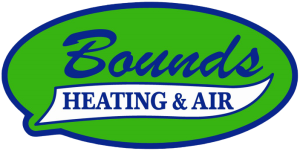Tackling Indoor Humidity

With frequent weather changes during this time of year, there is no telling when high heat and humidity will pose a problem. The team here at Bounds Heating & Air is here to educate you on the causes of high home humidity and how to reduce moisture levels in your home.
Indoor Humidity = Discomfort
Floridians are no strangers to humidity and the stuffy feeling that so often hangs in the air. Humidity not only causes an uncomfortable feeling in your home, it can also negatively affect your health. Humid air causes a slowing of the evaporation of moisture from your body, resulting in an increase in body temperature and even difficulty breathing.
Mold Growth
High temperatures in your home combined with humidity result in an ideal breeding ground for mold growth. Development of mold can be a fast process as mold spores multiply and spread throughout your home. Once mold growth begins, it can become difficult to control. But you can reduce the occurrence of mold spore growth by controlling humidity in your home.
Condensation
One clear sign of high humidity levels in your home is window condensation. When you spot condensation on your windows it is essential to wipe the window dry. Allowing condensation to linger can cause window frame damage, frame rotting, and mold development.
Here’s a few useful tips to help you maintain and lower humidity levels in your home:
- Increase Air Circulation – Running ceiling fans helps with air circulation by drying out standing water within your home. Increasing air circulation will also decrease overall room temperature.
- Check For Water Leaks – Water leaks can be a contributing factor to high humidity in your home. It is recommended to regularly check for leaks under sinks, behind toilets, and in laundry rooms.
- Run Exhaust Fans – Cooking and showering can contribute to high humidity levels. Running exhaust fans avoids buildup of moisture throughout your home.
- Monitor Outdoor Weather – Outdoor humidity will affect your home’s indoor humidity levels. When indoor humidity levels are high and outdoor humidity levels are low it is recommended to open your windows to circulate air and humidity throughout your home. If outdoor humidity levels are higher, it is essential to keep all windows closed as it may throw off levels in your home.
- Home Dehumidifiers – Typically air conditioning units remove humidity from the air, but in some cases you may see that it takes longer to regulate indoor humidity. Home dehumidifiers can help with maintaining humidity levels alongside your A/C unit. With home dehumidifiers, you are able to set your ideal humidity level in your home and the system will help maintain the levels of moisture in your home.
If you have further questions on your home air quality, reach out to the experts at Bounds Heating & Air at 352-472-2761.


 Think about the amount of time that you spend in your home. Now imagine the number of toxic compounds in your home that come from chemical-based cleaning products, air-fresheners, and other products. These are everyday household items that you typically don’t think twice about, but they can emit toxins that are detrimental to your health. Other indoor pollutants can stem from pollen, mold, bacteria, and more! These pollutants tend to be more harmful in small or poorly ventilated areas.
Think about the amount of time that you spend in your home. Now imagine the number of toxic compounds in your home that come from chemical-based cleaning products, air-fresheners, and other products. These are everyday household items that you typically don’t think twice about, but they can emit toxins that are detrimental to your health. Other indoor pollutants can stem from pollen, mold, bacteria, and more! These pollutants tend to be more harmful in small or poorly ventilated areas. During the hot summer days here in Florida, you may find it difficult to keep the temperature in your home balanced. Whether you have a sitting room that is exposed to large amounts of sunlight and never stays cool or a room that is always too cold, you may be wondering how to find a balance in temperatures. This problem stems from a traditional HVAC system that uses one thermostat to regulate the temperature of your entire home. With traditional HVAC systems, you may find yourself turning the AC up too high or too low to accommodate that one area of your home that doesn’t maintain the same temperature as other rooms, which can also increase your bill.
During the hot summer days here in Florida, you may find it difficult to keep the temperature in your home balanced. Whether you have a sitting room that is exposed to large amounts of sunlight and never stays cool or a room that is always too cold, you may be wondering how to find a balance in temperatures. This problem stems from a traditional HVAC system that uses one thermostat to regulate the temperature of your entire home. With traditional HVAC systems, you may find yourself turning the AC up too high or too low to accommodate that one area of your home that doesn’t maintain the same temperature as other rooms, which can also increase your bill. Typically when people experience problems with their home air quality, they associate the issue with malfunctions within the HVAC system as a whole. Although, one thing that people tend to overlook is their air filter. Do you remember the last time you changed your air filter? Air filters serve as a barrier that prevents harmful debris, pollutants, pollen, and dust, from entering into your home. Depending on the amount of activity and or pets in your home, it is recommended to change your air filters every 60 to 90 days. Lack of replacing air filters in your home can lead to:
Typically when people experience problems with their home air quality, they associate the issue with malfunctions within the HVAC system as a whole. Although, one thing that people tend to overlook is their air filter. Do you remember the last time you changed your air filter? Air filters serve as a barrier that prevents harmful debris, pollutants, pollen, and dust, from entering into your home. Depending on the amount of activity and or pets in your home, it is recommended to change your air filters every 60 to 90 days. Lack of replacing air filters in your home can lead to:
